新概念英语第二册课堂笔记:第25课
新概念英语第二册-Lesson25知识讲解67页文档

10、一个人应该:活泼而守纪律,天 真而不 幼稚, 勇敢而 鲁莽, 倔强而 有原则 ,热情 而不冲 动,乐 观而不 盲目。 ——马 克思
谢谢你的阅读
❖ 知识就是财富 ❖ 丰富你的人生
新概念英语第二册Lesson25知识讲解
6、纪律是自由的第一条件。——黑格 尔 7、纪律是集体的面貌,集体的声音, 集体的 动作, 集体的 表情, 集体的 信念。 ——马 卡连柯
8、我们现在必须完全保持党的纪律, 否则一 切都会 陷入污 泥中。 ——马 克思 9、学校没有纪律便如磨坊没有水。— —夸美 纽斯
71、既然我已经踏上这条道路,那么,任何东西都不应妨碍我沿着这条路走下去。——康德 72、家庭成为快乐的种子在外也不致成为障碍物但在旅行之际却是夜间的伴侣。——西塞罗 73、坚持意志伟大的事业需要始终不渝的精神。——伏尔泰 74、路漫漫其修道远,吾将上Байду номын сангаас而求索。——屈原 75、内外相应,言行相称。——韩非
新概念第二册课文翻译及学习笔记【Lesson25、26、27】

新概念第二册课文翻译及学习笔记【Lesson25、26、27】【课文】First listen and then answer the question.听录音,然后回答以下问题。
Why does the writer not understand the porter?I arrived in London at last. The railway station was big,black and dark. I did not know the way to my hotel, so Iasked a porter. I not only spoke English very carefully, butvery clearly as well. The porter, however, could notunderstand me. I repeated my question several times and atlast he understood. he answered me, but he spoke neitherslowly nor clearly. 'I am a foreigner,' I said. Then he spokeslowly, but I could not understand him. My teacher neverspoke English like that! The porter and I looked at eachother and smiled. Then he said something and I understood it.'You'll soon learn English!' he said. I wonder. In England,each person speaks a different language. The Englishunderstand each other, but I don't understand them! Do theyspeak English?【课文翻译】我终于到了伦敦。
新概念英语第二册 lesson25详尽版
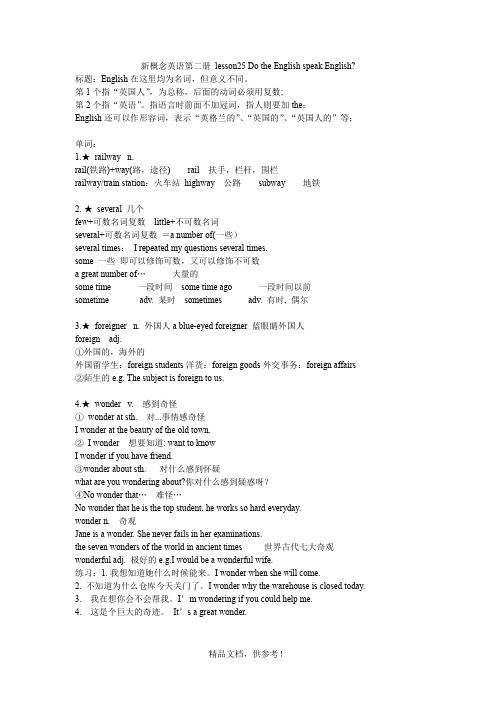
新概念英语第二册lesson25 Do the English speak English?标题:English在这里均为名词,但意义不同。
第1个指“英国人”,为总称,后面的动词必须用复数;第2个指“英语”。
指语言时前面不加冠词,指人则要加the:English还可以作形容词,表示“英格兰的”、“英国的”、“英国人的”等;单词:1.★railway n.rail(铁路)+way(路,途径) rail 扶手,栏杆,围栏railway/train station:火车站highway 公路subway 地铁2.★several 几个few+可数名词复数little+不可数名词several+可数名词复数=a number of(一些)several times:I repeated my questions several times.some 一些即可以修饰可数,又可以修饰不可数a great number of…大量的some time 一段时间some time ago 一段时间以前sometime adv. 某时sometimes adv. 有时, 偶尔3.★foreigner n. 外国人a blue-eyed foreigner 蓝眼睛外国人foreign adj.①外国的,海外的外国留学生:foreign students洋货:foreign goods外交事务:foreign affairs ②陌生的e.g. The subject is foreign to us.4.★wonder v. 感到奇怪①wonder at sth. 对...事情感奇怪I wonder at the beauty of the old town.②I wonder 想要知道: want to knowI wonder if you have friend.③wonder about sth. 对什么感到怀疑what are you wondering about?你对什么感到疑惑呀?④No wonder that…难怪…No wonder that he is the top student, he works so hard everyday.wonder n.奇观Jane is a wonder. She never fails in her examinations.the seven wonders of the world in ancient times 世界古代七大奇观wonderful adj. 极好的e.g.I would be a wonderful wife.练习:1. 我想知道她什么时候能来。
新概念第二册Lesson25重要词组及语法讲解

新概念第二册Lesson25重要词组及语法讲解wonder* 感到惊讶,感到诧异They wondered that there was a modern building in that district.They wondered at the beauty of the old town.*(对…)感到疑惑/怀疑,想知道I wonder what will happen next.Will he come to dinner? I wonder.* n. 奇迹,奇观,器材;惊奇,惊讶Jane is a wonder. She never fails in her examination.She looked at the boss in wonder.He is curious about the seven wonders of the world in ancient times。
No wonder. 怪不得。
1.我很好奇。
I wonder.2.我为他的粗鲁吃惊。
I wonder at his rudeness.3.我想知道他是谁。
I wonder who he is.4.我想知道他是怎么做的。
I wonder how he did it.5.我想知道她什么时候能来。
I wonder when she will come.6.我想知道为什么博物馆今天关门了。
I wonder why the museum is closed today7.我在想你会不会帮我。
I’m wondering if you could help me.8.这是个巨大的奇迹。
It’s a great wonder.the+ adj. 表示一类人* the+adj. 若表示一类具有某种特征或特性的人时,通常表示复数意义,若用作主语,谓语要用复数。
The rich get richer and the poor get poorer.The injured were carried away on stretchers.The old are more likely to catch cold than the young.* the+adj. 若表示抽象概念,则表示单数意义,用作主语时,谓语要用单数。
25课笔记

[裕兴新概念]第二册第25课:Do the English speak English?英国人讲的是英语吗一.单词讲解railway n.铁路,铁道(BR)railroad n.铁咱,铁道(AM)a line of railway 一条铁路railway 火车站railway n.轨道eg:The railway was oende to traffic last year.这条铁路是去年通车的high level railway 高架铁路subway 美式地铁tube=underground 英式地铁metro 法国巴黎的地铁rail n. 横杆,扶手,围栏,轨道jump the rail 出轨stair rails 楼梯扶手ride the rails 逃票乘火车sit on the rails (AM) 骑墙,保持中立railing n. 栏杆iron-bar railing 铁栏杆porter n. 搬运工,脚夫(在车站,机场,旅馆等处的搬运工)bellboy / pageboy (AM)旅馆,俱乐部等通常穿制服的男服务员port n. 港,口岸chear a port 出港close a port 封港reach a port=enter a port 入港eg: Many chips frequent the port 许多船只常来入港eg:Any port in s storm 慌不择路,穷途之策(谚语)several 几个1)More than three but fewer than many .一些几个(比三多一些,比许多少一些)eg:Several more people than usual came to the concert.来议会的人比平常多了一些。
eg:I regeated my question several times. (几次,几遍)我把问题重复了好几遍2)各自的,各个的(正式说法)eg:Several men ,several minds.人各有志。
新概念英语 第二册 lesson25-38笔记

lesson25笔记1.railway station 火车站2.several adj. 几个+ pl.3.wonder at = be surprised at 对。
感到吃惊4.work wonders 创造奇迹5.at last= in the end = finally 最终;最后6.the answer to the question 问题的答案7.the key to the door 门上的钥匙8.not only....but also= not only....but ...as well=not only... but....too不但。
而且(连接两个主语时,动词形式采取就近原则)eg:Not only I but also Lucy is a student.不但露西是学生,而且我也是学生。
9.neither ... nor ....既不。
也不(连接两个主语时,动词形式采取就近原则)eg:Neither Lucy nor I am a student.既不是露西是学生,也不是我是学生。
10.冠词小语法:the+ 特殊形容词表示一类人(1)the + 国籍形容词the + English 英国人(2) the + 老弱病残the old/ blind/young/rich/ poor/deaf老人/ 盲人/年轻人/富人/穷人/聋哑人lesson25生词1.railway/ˈreɪlweɪ/ n. 铁路2.platform /ˈplætfɔːm/ n.站台3.timetable列车时间表4. rail /reɪl/ n. 扶手;栏杆;铁轨5.porter /ˈpɔːtə(r)/ n. 搬运工6.port/pɔːt/ n. 港口7.seaport 海港8.import /ˈɪmpɔːt/n. / v.进口9.export /ɪkˈspɔːt/v./n. 出口10.several /ˈsevrəl/ adj. 几个11.cookie /ˈkʊki/ n.饼干;小点心12.biscuit /ˈbɪskɪt/ n.饼干;小点心13.foreigner/ˈfɒrənə(r)/ n. 外国人14.foreign/ˈfɒrən/ adj. 外国的15.wonder /ˈwʌndə(r)/ v.想知道;吃惊n. 奇迹16. repeat /rɪˈpiːt/ v. 重复生词1.wizard [ˈwɪzəd] n. 男巫2.magical [ˈmædʒɪkl] adj. 有魔力的3.hunger [ˈhʌŋɡər] n.饥饿4.continue [kənˈtɪnjuː] v. 继续5.weak [wiːk] adj. 虚弱的6.feed [fiːd] v. 喂养;进食7.farmland [ˈfɑːmlænd] n. 农田8.step [step] n. 脚步;步骤;梯级vi. 踩9.fit [fɪt] v. 适合adj. 健康的10.brain [breɪn] n. 大脑11.require [rɪˈkwaɪə] vt. 要求12.strengthen [ˈstreŋθn] v. 加强;巩固13.memory [ˈmeməri] n. 记忆;回忆14.aim [eɪm] n. 目的;瞄准15.wake [weɪk] v. 醒来;唤醒;16.source [sɔːs] n. 来源17.berry /ˈberi/ n. 浆果类18.spinach [ˈspɪnɪtʃ] n. 菠菜19.figure [ˈfɪɡjər] n. 数字20.challenge /ˈtʃælɪndʒ/ n. 挑战21.benefit [ˈbenɪfɪt] n. 利益v.受益;22.master [ˈmæstər] n. 主人;大师;v. 掌握23.sudoku [suˈdoʊkuː] n. 数独,九宫格游戏24.mental [ˈmentl] adj. 脑力的25.effective [ɪˈfektɪv] adj. 有效的,26.perform [pərˈfɔːrm] v. 执行;演奏27.level [ˈlevl] n.水平28.skill [skɪl] n. 技能29.social [ˈsoʊʃl] adj. 社会的,社交的30.media [ˈmiːdiə] n. 媒体31.download /daʊn'ləʊd/ vt. 下载32.check [tʃek] vt. 检查33.update [ˌʌpˈdeɪt] vt. 更新34.distance [ˈdɪstəns] n. 距离vt. 疏远35.influence [ˈɪnfluəns] n. & v. 影响36.normal [ˈnɔːrml] adj. 正常的37.blog [blɑːɡ] n. 博客38.balance [ˈbæləns] n./ v. 平衡39.interest [ˈɪntrest] n. 兴趣;利益;vt. 使……感兴趣;40.personal [ˈpɜːrsənl] adj. 个人的41.function [ˈfʌŋkʃn] n. 功能;42.connect [kəˈnekt] v. 连接;联合43.warn [wɔːrn] v. 警告,提醒44.risk [rɪsk] n. 危险45.post [poʊst] v.张贴munity [kəˈmjuːnəti] n. 社区47.consider [kənˈsɪdər] v. 考虑;认为;48.instead of 代替;而不是49.social media 社会媒体50.in addition 另外51.figure out 解决;算出;弄清楚52.wake up 醒来;叫醒53.once upon a time 从前54.be short of 缺乏……55.be dying of 死于。
新概念2册L25课备课笔记精讲
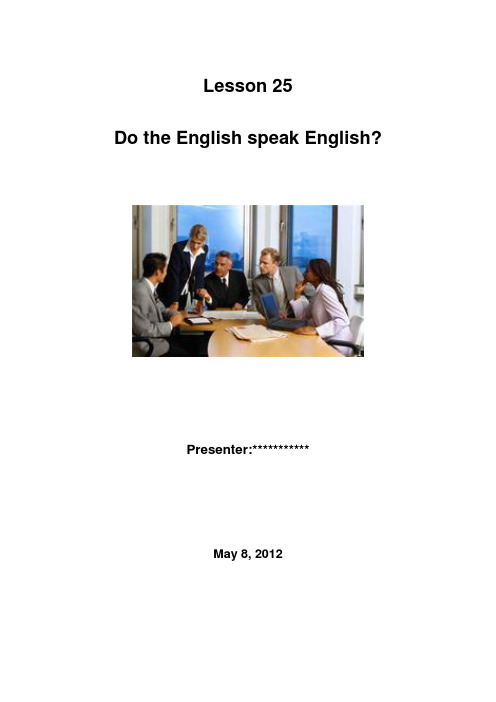
Lesson 25Do the English speak English?Presenter:***********May 8, 2012ContentsPart One About the Title (3)Part Two New words (3)Part Three Language Points and Text Analysis (5)Part Four Grammar (8)Part Five Oral Practice (9)第一部分:Title:Do the English speak English?the English: 国家语言前加定冠词the,表一个国家的人,the Chinese, the Korean.1996年囊括9项奥斯卡大奖的二战类影片The English Patient.the British 表示英国人the United Kingdom of Great Britain and Northern Island: England, Northern Island, Scotland and Wales.形容词前加the表示这一类人:the poor, the young, the old, the richSpeak:后接语言,表讲某种语言。
tell 讲故事,say 接说的内容,talk 谈论,在第一课讲解conversation时解读过其用法;第二部分:单词railway n. 铁路= railroad 合成词rail 铁轨+ road 道路rail 铁轨+ way 道路词源:road 一般泛指“路”,有时也说“马路”。
追本溯源,发现road与“马”也有关联。
road 在古英语中词形是rād, 原义是riding骑马,与rīdan(骑马)有亲缘关系,而ride即源于此,所以可以说road与ride同出一源。
到了16世纪末,road才开始用于“供马行走的路”和“路”这一今天的含义。
新概念二-新概念英语第二册第25课-Do the English speak English-
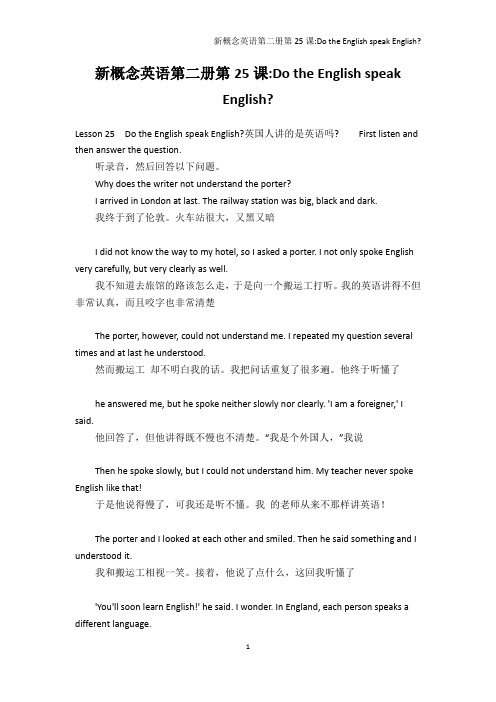
新概念英语第二册第25课:Do the English speakEnglish?Lesson 25 Do the English speak English?英国人讲的是英语吗?First listen and then answer the question.听录音,然后回答以下问题。
Why does the writer not understand the porter?I arrived in London at last. The railway station was big, black and dark.我终于到了伦敦。
火车站很大,又黑又暗I did not know the way to my hotel, so I asked a porter. I not only spoke English very carefully, but very clearly as well.我不知道去旅馆的路该怎么走,于是向一个搬运工打听。
我的英语讲得不但非常认真,而且咬字也非常清楚The porter, however, could not understand me. I repeated my question several times and at last he understood.然而搬运工却不明白我的话。
我把问话重复了很多遍。
他终于听懂了he answered me, but he spoke neither slowly nor clearly. 'I am a foreigner,' I said.他回答了,但他讲得既不慢也不清楚。
“我是个外国人,”我说Then he spoke slowly, but I could not understand him. My teacher never spoke English like that!于是他说得慢了,可我还是听不懂。
《新概念英语》第二册学习笔记26 25课

《新概念英语》第二册学习笔记26 25课第26课The best art critics1、I am an art student.art student 学艺术的学生fine arts 美术2、They always tell you what a picture is 'about'.此句实际就是说:They always tell you what a picture means. 注意about的用法3、We like them in the same way that we like pretty curtain material.them 指代前面说patternsin the same way that 以同样的方式4、I think that young children often appreciate modern pictures better than anyone else.appreciate 此句中意思是欣赏anyone else 指除了young children 以外的任何人5、I'm hanging this picture on the wall. It's a new one.one 指代picture, picture 是指笼统意义上的picture6、But isn't it upside down?反问句,反问句的构成就是把助动词的否定形式提前7、She was right! It was!It was = It was upside down.8、She always tells me whether my pictures are good or not.whether 引导的宾语从句,语序按陈述句,whether 后面也可以跟不定式短语whether ......or not 是否,有时or not 可以省略。
新概念英语第二册第25课-Do the English speak English-

新概念英语第二册第25课:Do the English speak English?Lesson 25 Do the English speak English?英国人讲的是英语吗?First listen and then answer the question.听录音,然后回答以下问题。
Why does the writer not understand the porter?I arrived in London at last. The railway station was big, black and dark.我最终到了伦敦。
火车站很大,又黑又暗I did not know the way to my hotel, so I asked a porter. I not only spoke English very carefully, but very clearly as well.我不知道去旅馆的路该怎么走,于是向一个搬运工打听。
我的英语讲得不但特别仔细,而且咬字也特别清晰The porter, however, could not understand me. I repeated my question several times and at last he understood.然而搬运工却不明白我的话。
我把问话重复了许多遍。
他最终听懂了he answered me, but he spoke neither slowly nor clearly. I am a foreigner, I said.他回答了,但他讲得既不慢也不清晰。
“我是个外国人,”我说Then he spoke slowly, but I could not understand him. My teacher never spoke English like that!于是他说得慢了,可我还是听不懂。
新概念英语笔记(第二册,25-48课)

Nce2-25:Do the English speak English?1、Do the English speak English?1)English:(1)第一个English:英国人(总称,其前加the,其后的动词必须用复数);第二个English:英语。
指人时,前面加the,指语言时,前面不加the。
例:The English often talk about the weather. 英国人经常谈论天气。
Do you speak English? 你会说英语吗?(2)English:adj 英格兰的、英国的、英国人的(3)与English类似的单词有:French、Chinese、Japanese2、I arrived in London at last.1)At last =In the end:终于,一般暗指经过一番等待、麻烦(苦恼)或努力之后例:It is my turn at last. 终于轮到我了。
At least:至少;Lastely:最近的一段时间、最新的2)Arrive:vi 到达Arrive in +大地方:到达……(地点);例:I arrived in London.Arrive at +小地方:到达……(地点);例:I arrived at that station.Reach +宾语:到达(Reach后面必须加宾语)Get to +宾语:到达Get home:到家;Get there:到那里例:When will you get to Beijing(arrive in Beijing;reach Beijing)?注:Get home:到家;Get there:到那里(Home和there是副词,副词和动词连用时,前面不用加介词,arrive和get也一样,一般不用reach home / there,如果用reach home / there,则home是名词,there是代词)3、The railway station was big, black and dark. 火车站又大又黑又暗。
新概念英语第二册笔记新版:第25课

Lesson 25 Do the English speak English?【New words and expressions】(5)railway n. 铁路porter n. 搬运⼯several quantifier ⼏个foreigner n. 外国⼈wonder v. 感到奇怪★railway n. 铁路railroad 铁路(美)railway/railroad station ⽕车站★several quantifier ⼏个several=a number of… ⼀些,只能修饰可数several times 许多次(不能说some times)some ⼀些, 即可以修饰可数, ⼜可以修饰不可数a great number of… ⼤量的some time ⼀段时间 some time age ⼀段时间以前sometime adv. 某时I will defeat you sometime. (总有⼀天我将打败你)sometimes adv. 有时, 偶尔★wonder v. 感到奇怪① n. 奇迹,奇观,奇才;惊奇,惊讶Jane is a wonder. She never fails in her examinations.the seven wonders of the world in ancient times 世界古代七⼤奇观② vi.&vt. 感到惊讶,感到诧异,对……事情感奇怪They wondered that there was a modern building in district.wonder at sth.I wonder at the beauty of the old town.③ vt.&vi.(对……)感到疑惑/怀疑,想要知道wonder +if +从句是否……I wonder if you have any spare time.wonder +特殊疑问词 +从句I wonder what time it is.I wonder why you are late.I wondered where you were going.Could you tell me how to get to?/I wondered how to get there. 问路no wonder 难怪wonderful adj. 极好的【Text】I arrived in London at last. The railway station was big, black and dark. I did not know the way to my hotel, so I asked a porter.I not only spoke English very carefully, but very clearly as well. The porter, however, could not understand me. I repeated my question several times and at last he understood. He answered me, but he spoke neither slowly nor clearly. 'I am a foreigner,' I said. Then he spoke slowly, but I could not understand him. My teacher never spoke English like that! The porter and I looked at each other and smiled. Then he said something and I understood it. 'You'll soon learn English!' he said. I wonder. In England, each person speaks a different language. The English understand each other, but I don't understand them! Do they speak English?参考译⽂我终于到了伦敦. ⽕车站很⼤, ⼜⿊⼜暗. 我不知道去饭店的路该怎么⾛, 于是向⼀个搬运⼯打听. 我的英语讲得不但⾮常认真, ⽽且咬字也⾮常清楚. 然⽽搬运⼯却不明⽩我的话. 我把问话重复了很多遍. 他终于听懂了. 他回答了, 但他讲得既不慢也不清楚.“我是个外国⼈, “我说. 于是他说得慢了, 可我还是听不懂. 我的⽼师从来不那样讲英语!我和搬运⼯相视⼀笑. 接着, 他说了点什么, 这回我听懂了. “您会很快学会英语的!” 他说. 我感到奇怪. 在英国, ⼈们各⾃说着⼀种不同的语⾔. 英国⼈之间相互听得懂, 可我却不懂他们的话!他们说的是英语吗?【课⽂讲解】1、Do the English speak English?English这⾥均为名词,第⼀个指“英国⼈”,前⾯要加the,表⽰⼀个群体,后⾯的动词必须⽤复数;第⼆个指“英语”,指语⾔时前⾯不加冠词。
新概念第二册第二单元第25-48课知识点总结

Lesson 31 Success story
retire, company, bicycle, save, workshop, helper, employ, grandson
used to do的用法
Lesson 32 Shopping mode easy
Lesson 34 Quick work
station, most
被动语态(参考第10课)
Lesson 35 Stop thief!
while, regret, far, rush, act, straight, fright, battered, shortly, afterwards
复习第26-34课的关键句型
Lesson 36 Across the channel!
record, strong, swimmer, succeed, train, anxiously, intend, solid
一般将来时:be going to与will(参考第一册第37-40课以及第91-96课)
Lesson 37 The Olympic Games
动名词的用法(参考第20课)
Lesson 45 A clear conscience
clear, conscience, wallet, savings, villager, percent
复习第10、21、34课关键句型:被动语态
Lesson 46 Expensive and uncomfortable
thirsty,ghost, haunt, block, furniture, whisky, suggest, shake, accept
新概念英语第二册笔记-第二十五课

新概念英语第二册笔记-第二十五课railway n. 铁路,铁道 [U] (Br.)/ railroad (Am.)a line of railway 一条铁路railway station 火车站railway n. 轨道 (pl.) [C]eg. The railway was opened to traffic last year. 这条铁路是去年通车的。
high level railway 高架铁路表示“地铁”的词汇:subway ['sʌbwei] (Am.)tube [tju:b] (Br.)underground (Br.)metro ['metrəu] (Paris) 地铁rail n. 横杆,扶手,围栏,轨道jump rail 出轨stair rails 楼梯扶手ride the rails 逃票乘火车sit on the rails (Am.) 骑墙,保持中立railing n. 栏杆iron-bar railing 铁栏杆porter n. 搬运工,脚夫(在车站,机场,旅社等处的)bellboy / pageboy (Am.) 旅社,俱乐部等通常穿降服的男服务员port n. 港,口岸clear a port出港close a port 封港reach a port / enter a port入港eg. Many ships frequent the port. 许多船只常来此港。
eg. Any port in a storm. 慌不择路,穷途之策。
(谚)several1) more than three but fewer than many一些,几个eg. Several more people than usual came to the concert.来音乐会的人比平常多了几个。
eg. I repeated my questions several times. 我把问题重复了几遍。
DotheEnglishspeakEnglish?新概念英语第二册自学导读笔记第25课
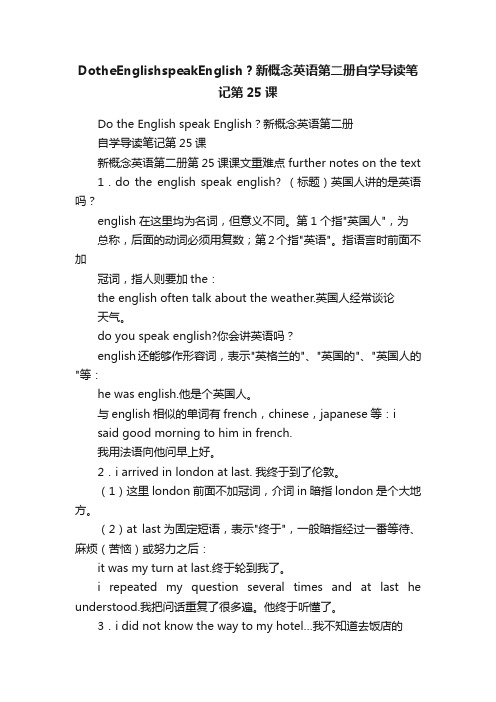
DotheEnglishspeakEnglish?新概念英语第二册自学导读笔记第25课Do the English speak English?新概念英语第二册自学导读笔记第25课新概念英语第二册第25课课文重难点 further notes on the text 1.do the english speak english? (标题)英国人讲的是英语吗?english在这里均为名词,但意义不同。
第1个指"英国人",为总称,后面的动词必须用复数;第2个指"英语"。
指语言时前面不加冠词,指人则要加the:the english often talk about the weather.英国人经常谈论天气。
do you speak english?你会讲英语吗?english还能够作形容词,表示"英格兰的"、"英国的"、"英国人的"等:he was english.他是个英国人。
与english相似的单词有french,chinese,japanese等:isaid good morning to him in french.我用法语向他问早上好。
2.i arrived in london at last. 我终于到了伦敦。
(1)这里london前面不加冠词,介词in暗指london是个大地方。
(2)at last为固定短语,表示"终于",一般暗指经过一番等待、麻烦(苦恼)或努力之后:it was my turn at last.终于轮到我了。
i repeated my question several times and at last he understood.我把问话重复了很多遍。
他终于听懂了。
3.i did not know the way to my hotel…我不知道去饭店的路该怎么走……my hotel不是指属于我的饭店(或旅馆),而是指我已订了房间或者要去住的饭店。
新概念英语第二册第25课-Do the English speak English-

新概念英语第二册第25课:Do the English speakEnglish?Lesson 25 Do the English speak English英国人讲的是英语吗First listen and then answer the question.听录音,然后答复以下问题。
Why does the writer not understand the porterI arrived in London at last. The railway station was big, black and dark.我终于到了伦敦。
火车站很大,又黑又暗I did not know the way to my hotel, so I asked a porter. I not only spoke English very carefully, but very clearly as well.我不知道去旅馆的路该怎么走,于是向一个搬运工打听。
我的英语讲得不但非常认真,而且咬字也非常清楚The porter, however, could not understand me. I repeated my question several times and at last he understood.然而搬运工却不明白我的话。
我把问话重复了很多遍。
他终于听懂了he answered me, but he spoke neither slowly nor clearly. I am a foreigner, I said.他答复了,但他讲得既不慢也不清楚。
“我是个外国人,〞我说Then he spoke slowly, but I could not understand him. My teacher never spoke English like that!于是他说得慢了,可我还是听不懂。
我的老师从来不那样讲英语!The porter and I looked at each other and smiled. Then he said something and I understood it.我和搬运工相视一笑。
新概念英语第二册课堂笔记:第25课
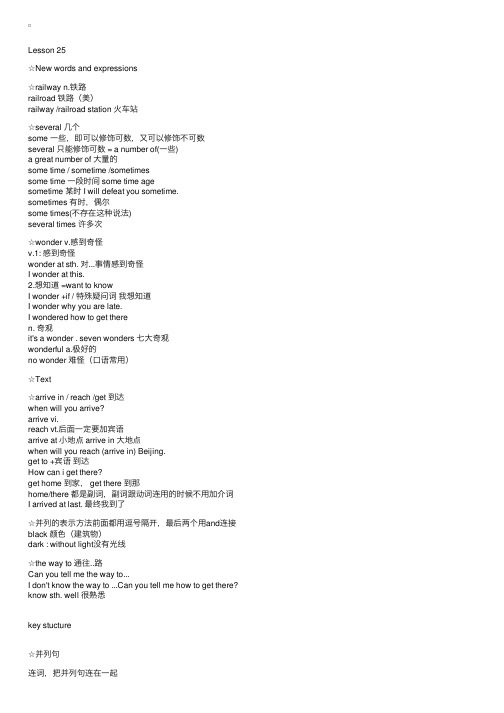
Lesson 25☆New words and expressions☆railway n.铁路railroad 铁路(美)railway /railroad station ⽕车站☆several ⼏个some ⼀些,即可以修饰可数,⼜可以修饰不可数several 只能修饰可数 = a number of(⼀些)a great number of ⼤量的some time / sometime /sometimessome time ⼀段时间 some time agesometime 某时 I will defeat you sometime.sometimes 有时,偶尔some times(不存在这种说法)several times 许多次☆wonder v.感到奇怪v.1: 感到奇怪wonder at sth. 对...事情感到奇怪I wonder at this.2.想知道 =want to knowI wonder +if / 特殊疑问词我想知道I wonder why you are late.I wondered how to get theren. 奇观it's a wonder . seven wonders 七⼤奇观wonderful a.极好的no wonder 难怪(⼝语常⽤)☆Text☆arrive in / reach /get 到达when will you arrive?arrive vi.reach vt.后⾯⼀定要加宾语arrive at ⼩地点 arrive in ⼤地点when will you reach (arrive in) Beijing.get to +宾语到达How can i get there?get home 到家, get there 到那home/there 都是副词,副词跟动词连⽤的时候不⽤加介词I arrived at last. 最终我到了☆并列的表⽰⽅法前⾯都⽤逗号隔开,最后两个⽤and连接black 颜⾊(建筑物)dark : without light没有光线☆the way to 通往..路Can you tell me the way to...I don't know the way to ...Can you tell me how to get there? know sth. well 很熟悉key stucture☆并列句连词,把并列句连在⼀起and 和but 但是so 因此yet adv.然⽽ have you finished yet?yet = but 放在两个句⼦中间,起转折作⽤or 或者,否则hurry up, you will be late./hurry up, or you will be late. both...and... 不但...⽽且either...or... 或者...或者,要么...要么either you or Ineither ...nor... 既不...也不not only ...but...as well 不但...⽽且...not only ...but also.. 不但...⽽且...。
裕兴新概念英语第二册笔记 第25课

Lesson 25 Do the English speak English? 英国人讲的是英语吗?Why does the writer not understand the porter?I arrived in London at last. The railway station was big, black and dark. I did not know the way to my hotel, so I asked a porter. I not only spoke English very carefully, but very clearly as well. The porter, however, could not understand me. I repeated my question several times and at last he understood. he answered me, but he spoke neither slowly nor clearly. 'I am a foreigner,' I said. Then he spoke slowly, but I could not understand him. My teacher never spoke English like that! The porter and I looked at each other and smiled. Then he said something and I understood it.'You'll soon learn English!' he said. I wonder. In England, each person speaks a different language. The English understand each other, but I don't understand them! Do they speak English?参考译文我终于到了伦敦。
- 1、下载文档前请自行甄别文档内容的完整性,平台不提供额外的编辑、内容补充、找答案等附加服务。
- 2、"仅部分预览"的文档,不可在线预览部分如存在完整性等问题,可反馈申请退款(可完整预览的文档不适用该条件!)。
- 3、如文档侵犯您的权益,请联系客服反馈,我们会尽快为您处理(人工客服工作时间:9:00-18:30)。
新概念英语第二册课堂笔记:第25课Lesson 25
☆New words and expressions
☆railway n.铁路
railroad 铁路(美)
railway /railroad station 火车站
☆several 几个
some 一些,即能够修饰可数,又能够修饰不可数several 只能修饰可数 = a number of(一些)
a great number of 大量的
some time / sometime /sometimes
some time 一段时间 some time age
sometime 某时 I will defeat you sometime. sometimes 有时,偶尔
some times(不存有这种说法)
several times 很多次
☆wonder v.感到奇怪
v.1:感到奇怪
wonder at sth. 对...事情感到奇怪
I wonder at this.
2.想知道 =want to know
I wonder +if / 特殊疑问词我想知道
I wonder why you are late.
I wondered how to get there
n. 奇观
it's a wonder . seven wonders 七大奇观
wonderful a.极好的
no wonder 难怪(口语常用)
☆Text
☆arrive in / reach /get 到达
when will you arrive?
arrive vi.
reach vt.后面一定要加宾语
arrive at 小地点 arrive in 大地点
when will you reach (arrive in) Beijing.
get to +宾语到达
How can i get there?
get home 到家, get there 到那
home/there 都是副词,副词跟动词连用的时候不用加介词I arrived at last. 最终我到了
☆并列的表示方法前面都用逗号隔开,最后两个用and连接
black 颜色(建筑物)
dark : without light没有光线
☆the way to 通往..路
Can you tell me the way to...
I don't know the way to ...Can you tell me how to get there?
know sth. well 很熟悉
key stucture
☆并列句
连词,把并列句连在一起
and 和
but 但是
so 所以
yet adv.不过 have you finished yet?
yet = but 放在两个句子中间,起转折作用
or 或者,否则
hurry up, you will be late./hurry up, or you will be late.
both...and... 不但...而且
either...or... 或者...或者,要么...要么
either you or I
neither ...nor... 既不...也不。
